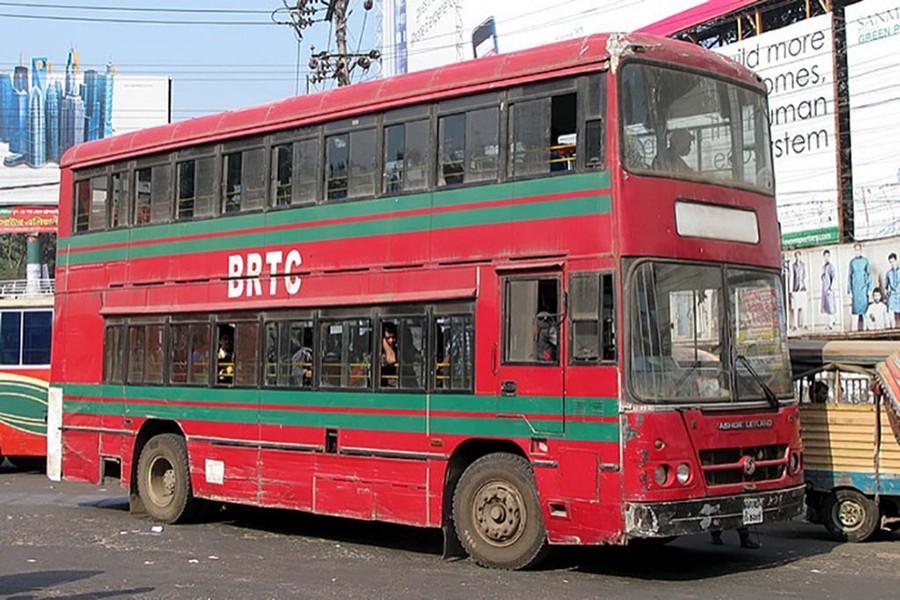
Published :
Updated :

The state-run Bangladesh Road Transport Corporation (BRTC) is no different from its siblings- the other state-run entities. Corruption, mismanagement, lack of proper supervision, losses - BRTC has been ceaseless in branding itself with all the essentials typical of a state agency in this country. At a time when private transport operators are doing fine capitalising on the inadequacies of the existing public transport system, the BRTC is in a shambles despite the facilities it enjoys as a state agency.
The question why BRTC is limping is not difficult to discern. For decades, it has been running its fleet of ramshackle buses -- single and double deckers -- much to the shock of passengers and also onlookers. One doesn't need to ride them to experience how pathetic and distressing these could be. Even a quick glance would tell there is no one to look after them, orphans that they are ever since they joined the fleet with the rust-red costume.
Recently, there were a few reports in the newspapers that mostly attempted to tell the narrative of a failing state entity. The main issues that came out were: leasing out the buses, poor or no maintenance, improper procurement, short economic life of the buses, and last but not least, corruption. Data presented in a local English daily the other day show that the corporation has been running on losses since 2016 up until December last year. According to data quoted in the reports, the BRTC's losses amounted to Tk 40.73 million in 2016-17, Tk 20.93 million in 2017-18, and Tk 10.47 million in the current fiscal till December.
Losses incurred by the corporation are only indicative of its overall ailment. But the reasons for losses, as the recent newspaper reports have pointed out, are clearly utter mismanagement, lack of monitoring and wrong decisions.
That there is something grievously wrong with the procurement and maintenance of the buses is not unknown even at the highest level. The road transport and bridges minister expressed his shock last week saying buses imported by the corporation become rickety too soon. 'Ultra modern vehicles arrive and after some days these become rickety with broken window panes,' he said. According to reports, between 1999-2001 and 2006-2007, the BRTC procured 646 buses and minibuses. Of these, 50 double-decker buses from Sweden went out of order within six to seven years, although their normal economic life was 20 years. Currently, only one of these buses is in operation and 49 are under heavy repairs since long.
Out of 30 Chinese CNG buses, only 15 are now in the BRTC fleet while only one is in operation and 14 under heavy repairs.
Out of around 400 Indian buses, only 132 are now on the roads.
Between 2009-2011 and 2012-2013 fiscals, the BRTC purchased 958 buses including 275 Chinese CNG buses, 255 Korean CNG, 88 AC and 50 articulated buses from India. According to the corporation, at present 173 Chinese CNG, 117 Korean CNG, 10 Indian AC and eight articulated buses are in unserviceable condition. Till date, the corporation reportedly has a total of 1,445 buses in its fleet, of which 921 are in serviceable condition, 360 were under heavy repairs and 164 were written off.
Ruining the buses well before their economic life has become so characteristic of the BRTC that seeking a remedy will require a total overhaul of the entire corporation. While lack of professionalism is attributed by observers and transport experts as the key malady afflicting the corporation, the fact remains that there are specific areas to work on, in that bringing professional aptitude is a bit too ambitious a proposition. This is to say, the areas have to be first identified including the flaws, drawbacks and constraints. It is here that procurement decisions as regards the right type of buses should figure supremely important. Equipping the workshops with machinery, equipment and skilled manpower must go hand in hand. It has been gathered that the BRTC workshops are in a bad shape. Short supply of equipment and spare parts has rendered them incapable of coping with the frequent repair and maintenance needs-worsened further by severe dearth of skilled manpower. There are complaints that lack of monitoring is largely responsible for less than expected income. Stealing is going on unabated, according to reports that quoted insiders.
These are but a few of the areas that come to mind, and the corporation itself should be better placed than outsiders to pinpoint more areas to work on.
So, adding more buses to its fleet is in no way a viable recourse for BRTC to overcoming its limitations and mending the wrongs. Thus, addition of 600 hundred new buses under India's line of credit does not inspire much hope. All that is required is a concerted move to revamp the corporation keeping in mind the operational deficiencies and policy flaws that have plagued it.


 For all latest news, follow The Financial Express Google News channel.
For all latest news, follow The Financial Express Google News channel.